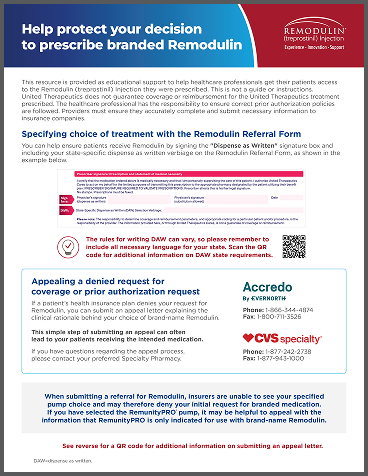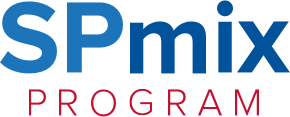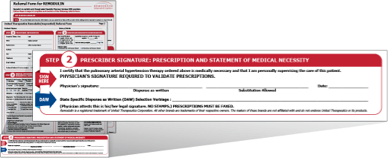You are using a browser that is not supported by this site. The site will not function properly. Please switch to the latest version of a supported browser such as Chrome, Safari, Edge, or Firefox to use this site.
Working with Specialty Pharmacies (SPs) for patients on Remodulin
For patients who are being treated with Remodulin, SPs provide support every step of the way, including:
- Dispensing medication and managing patients’ drug inventories and supplies
- Coordinating medication refills and treatment plans for patients
- Training on the use of Remodulin—in-home, hospital, or clinic teaching available
- Follow-up nurse visits to patients’ homes
- 24-hour hotline with staff who can answer questions from both patients and healthcare practices
Available SPs:
United Therapeutics Cares™: United for your patients
United Therapeutics Cares is a patient support program that connects your patients with a dedicated team of specialists who provide education on access, affordability, and treatment support from day one. Our team will work one-on-one with your patients to provide ongoing, personalized education and support while on a United Therapeutics therapy.
Visit UnitedTherapeuticsCares.com to learn more and enroll your patient today.
Call United Therapeutics Cares at 1-844-864-8437, Monday through Friday, 8:30 am - 7 pm ET.
Learn MoreReferral process
By referring Remodulin for your patients, you can initiate support with the SP of your choice. As soon as a patient’s Referral Form for Remodulin is received and successfully processed, the SP will initiate support. The referral process includes downloading the Referral Form, completing as instructed, and faxing to either Accredo or CVS Specialty at the fax numbers above.
To enroll your patient in United Therapeutics Cares, complete the Referral Form and fax to 1-800-380-5294.
Preserve Your Brand Choice
When you want to ensure patients receive Remodulin, indicate “Dispense as Written, Brand Medically Necessary, and No Substitution” in the space provided on the Remodulin Referral Form as shown in the example below.
For additional assistance with filling out your Remodulin Referral Form, download the Example Referral Form or contact a representative.
Prescriber Signature Example
Remodulin SPmix Program for IV Remodulin patients
The Remodulin SPmix Program delivers up to 7 days of premixed IV Remodulin and all necessary supplies to your patients’ homes each week.
Who is eligible?
The Remodulin SPmix Program is for patients who are physically or otherwise unable to mix their medication, or who would prefer to receive their medication premixed for use in the CADD®-Solis VIP or CADD-Legacy® ambulatory infusion pump.
Patients must be:
- On a stable dose of IV Remodulin for at least a month with no immediate plans for titration
- Self-mixing for at least 3 months prior to submitting an enrollment form for the program
The Remodulin SPmix Program is only available to IV Remodulin patients using the CADD®-Solis VIP or CADD-Legacy® ambulatory infusion pump with high-pH glycine sterile diluent for Remodulin. Remodulin may be administered as a continuous SC infusion or continuous IV infusion; however, because of the risks associated with chronic indwelling central venous catheters, including serious bloodstream infections, continuous IV infusion should be reserved for patients who are intolerant of the SC route, or in whom these risks are considered warranted.
Get your patients started
Determine if your patients are eligible and if the program is right for them.
Complete and submit a Remodulin SPmix Program Enrollment Form.
If your patient is eligible and has no immediate needs for titration, download a Remodulin SPmix Program Enrollment Form to start enrollment in the program.
SPmix Program details
Specialty Pharmacy nurses
A Specialty Pharmacy nurse will:
- Visit patients at home to teach them how to use the premixed cassettes and make sure patients can use the pump on their own
- Stay in contact to answer any questions you and your patients may have
Remodulin SPmix shipments
- Patients will receive more frequent shipments per month compared to their current shipment schedule.
- Patients will need to store the premixed IV Remodulin cassettes in a refrigerator.
- Each shipment contains the exact amount of medication necessary for the designated treatment period in convenient premixed cassettes.
- Patients will always have a backup supply of Remodulin and a high-pH glycine sterile diluent for Remodulin available for self-mixing.
- If a patient is traveling or moving, advise them to speak to the Specialty Pharmacy nurse for assistance. Shipments can be sent temporarily to an alternative location for your patient’s convenience. Specialty Pharmacies cannot deliver outside the United States.
- Some payer restrictions may apply. Your preferred Specialty Pharmacy will be able to help you identify areas/plans where restrictions may apply.
DAW=dispense as written; IV=intravenous; SC=subcutaneous.
Remodulin® (treprostinil) Injection
Important Safety Information for Remodulin
Warnings and Precautions
- Chronic intravenous (IV) infusions of Remodulin delivered using an external infusion pump with an indwelling central venous catheter are associated with the risk of blood stream infections (BSIs) and sepsis, which may be fatal. Therefore, continuous subcutaneous (SC) infusion is the preferred mode of administration.
- Avoid abrupt withdrawal or sudden large reductions in dosage of Remodulin, which may result in worsening of PAH symptoms.
- Titrate slowly in patients with hepatic insufficiency, because such patients will likely be exposed to greater systemic concentrations relative to patients with normal hepatic function.
- Remodulin is a pulmonary and systemic vasodilator. In patients with low systemic arterial pressure, treatment with Remodulin may produce symptomatic hypotension.
- Remodulin inhibits platelet aggregation and increases the risk of bleeding.
Adverse Reactions
- In clinical studies of SC Remodulin infusion, the most common adverse events reported were infusion site pain and infusion site reaction (redness, swelling, and rash). These symptoms were sometimes severe and sometimes required treatment with narcotics or discontinuation of Remodulin. The IV infusion of Remodulin with an external infusion pump has been associated with a risk of blood stream infections, arm swelling, paresthesias, hematoma, and pain. Other common adverse events (≥3% more than placebo) seen with either SC or IV Remodulin were headache (27% vs. 23%), diarrhea (25% vs. 16%), nausea (22% vs. 18%), rash (14% vs. 11%), jaw pain (13% vs. 5%), vasodilatation (11% vs. 5%), edema (9% vs. 3%), and hypotension (4% vs. 2%).
Drug Interactions
- Remodulin dosage adjustment may be necessary if inhibitors or inducers of CYP2C8 are added or withdrawn.
Specific Populations
- In patients with mild or moderate hepatic insufficiency, decrease the initial dose of Remodulin to 0.625 ng/kg/min of ideal body weight, and monitor closely. Remodulin has not been studied in patients with severe hepatic insufficiency.
- Safety and effectiveness of Remodulin in pediatric patients have not been established.
- It is unknown if geriatric patients respond differently than younger patients. Caution should be used when selecting a dose for geriatric patients.
- There are no adequate and well-controlled studies with Remodulin in pregnant women. It is not known whether treprostinil is excreted in human milk or if it affects the breastfed infant or milk production.
Indication
Remodulin is a prostacyclin vasodilator indicated for the treatment of pulmonary arterial hypertension (PAH; WHO Group 1) to diminish symptoms associated with exercise. Studies establishing effectiveness included patients with NYHA Functional Class II-IV symptoms and etiologies of idiopathic or heritable PAH (58%), PAH associated with congenital systemic-to-pulmonary shunts (23%), or PAH associated with connective tissue diseases (19%).
In patients with PAH requiring transition from epoprostenol, Remodulin is indicated to diminish the rate of clinical deterioration. Consider the risks and benefits of each drug prior to transition.
REMISIhcpFEB2025
Please see accompanying Full Prescribing Information for Remodulin.
For additional information, visit www.RemodulinPro.com or call Customer Service at 1-844-UNITHER (1-844-864-8437).
For additional information, visit www.RemodulinPro.com or call Customer Service at 1-844-UNITHER (1-844-864-8437).
Remodulin® (treprostinil) Injection
Important Safety Information for Remodulin
Warnings and Precautions
- Chronic intravenous (IV) infusions of Remodulin delivered using an external infusion pump with an indwelling central venous catheter are associated with the risk of blood stream infections (BSIs) and sepsis, which may be fatal. Therefore, continuous subcutaneous (SC) infusion is the preferred mode of administration.
- Avoid abrupt withdrawal or sudden large reductions in dosage of Remodulin, which may result in worsening of PAH symptoms.
- Titrate slowly in patients with hepatic insufficiency, because such patients will likely be exposed to greater systemic concentrations relative to patients with normal hepatic function.
- Remodulin is a pulmonary and systemic vasodilator. In patients with low systemic arterial pressure, treatment with Remodulin may produce symptomatic hypotension.
- Remodulin inhibits platelet aggregation and increases the risk of bleeding.
Adverse Reactions
- In clinical studies of SC Remodulin infusion, the most common adverse events reported were infusion site pain and infusion site reaction (redness, swelling, and rash). These symptoms were sometimes severe and sometimes required treatment with narcotics or discontinuation of Remodulin. The IV infusion of Remodulin with an external infusion pump has been associated with a risk of blood stream infections, arm swelling, paresthesias, hematoma, and pain. Other common adverse events (≥3% more than placebo) seen with either SC or IV Remodulin were headache (27% vs. 23%), diarrhea (25% vs. 16%), nausea (22% vs. 18%), rash (14% vs. 11%), jaw pain (13% vs. 5%), vasodilatation (11% vs. 5%), edema (9% vs. 3%), and hypotension (4% vs. 2%).
Drug Interactions
- Remodulin dosage adjustment may be necessary if inhibitors or inducers of CYP2C8 are added or withdrawn.
Specific Populations
- In patients with mild or moderate hepatic insufficiency, decrease the initial dose of Remodulin to 0.625 ng/kg/min of ideal body weight, and monitor closely. Remodulin has not been studied in patients with severe hepatic insufficiency.
- Safety and effectiveness of Remodulin in pediatric patients have not been established.
- It is unknown if geriatric patients respond differently than younger patients. Caution should be used when selecting a dose for geriatric patients.
- There are no adequate and well-controlled studies with Remodulin in pregnant women. It is not known whether treprostinil is excreted in human milk or if it affects the breastfed infant or milk production.
Indication
Remodulin is a prostacyclin vasodilator indicated for the treatment of pulmonary arterial hypertension (PAH; WHO Group 1) to diminish symptoms associated with exercise. Studies establishing effectiveness included patients with NYHA Functional Class II-IV symptoms and etiologies of idiopathic or heritable PAH (58%), PAH associated with congenital systemic-to-pulmonary shunts (23%), or PAH associated with connective tissue diseases (19%).
In patients with PAH requiring transition from epoprostenol, Remodulin is indicated to diminish the rate of clinical deterioration. Consider the risks and benefits of each drug prior to transition.
REMISIhcpFEB2025
Please see accompanying Full Prescribing Information for Remodulin.
For additional information, visit www.RemodulinPro.com or call Customer Service at 1-844-UNITHER (1-844-864-8437).
You are now leaving REMODULINPRO.COM for Healthcare Professionals
Click CONTINUE to proceed or CLOSE to return to RemodulinPro.com
PRESERVE YOUR BRAND CHOICE
To ensure patients receive your choice of Remodulin® (treprostinil), make sure to indicate “Dispense as Written, Brand Medically Necessary, and No Substitution” in the Prescriber Signature section of the Referral Form.
Please note that the rules for writing DAW vary by state. Our DAW Requirements Guide can help you find your specific state or territory requirements.





